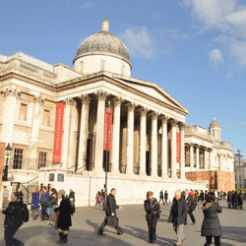About 22 per cent of staff at the National Gallery are striking this week over the privatisation of 400 visitor service jobs.
The industrial action from members of the Public and Commercial Services (PCS) union, which is taking place from 20-24 April and again on 1 May, follows on from strikes in February, when around 250 staff opted to strike against the outsourcing of hundreds of jobs to a security consultant who used to work for G4S
The Gallery employs 604 staff, with 300 members of staff being employed as Gallery Assistants. Some 132 people voted in the strike ballot, which was over 60 per cent of the Gallery’s staff who were PCS members.
The National Gallery has said that as a result of the strikes, many planned education events have had to be cancelled. It said more than 5,000 schoolchildren have had trips to the Gallery cancelled to date as a result of the strikes.
It also points out that PCS are maintaining a record of having undertaken strike action at the National Gallery “on average once every two months over the past nine years”.
The union is calling for a suspension in plans to privatise the Gallery's services until its new director has been appointed. The Gallery’s outgoing director, Nicholas Penny, will retire in August.
PCS general secretary Mark Serwotka said: "It is cynical of the gallery to try to press ahead with this sell-off in the run-up to the general election and before the new director has taken over.
"The process should be halted now and we should be given a proper chance to discuss maintaining services in-house."
An "election issue"
PCS said that the timing of the attempted privatisation has made it an “election issue” as tendering is due to start just two days before the general election.
Statements supporting the PCS members have been released by both the Labour and Green political parties.
The Labour party has said: “Whilst it is not for politicians to tell the board of trustees how to run the Gallery, the Labour Party is concerned by the on-going dispute, which is damaging the reputation of the Gallery, is undermining the morale amongst staff and is inconveniencing the public.
“We urge both sides of the dispute to get talking again as soon as possible so that the dispute can be resolved.”
The Green party has said it “opposed the privatisation at the National Gallery and calls for the Culture Select Committee and the next government to investigate the situation. The gallery should stop the tendering process until after the election when a new government can review the situation.”
The National Gallery responds
In a statement, a National Gallery spokesman said: “The PCS opposes the introduction of a new roster for some visitor facing and security staff which would enable us to operate more flexibly. In conjunction with the new roster we also proposed not only to meet the London Living Wage, but to pay a basic salary in excess of it.
“As a result of the PCS position, are now appointing an external partner to manage these services. Affected staff will transfer across; there will be no job cuts and terms and conditions will be protected."
The National Gallery has said it is one of the last major national UK museums to take this step.
“We believe the proposed changes are essential to enable us to deliver an enhanced service to our 6 million annual visitors for many years to come, and to remain as one of the world’s leading art galleries. It is unfortunate the PCS union do not share this aspiration with us,” the statement said.
The union is also calling for the reinstatement of a PCS representative at the National Gallery, who was suspended before the dispute began in February. The union have called Candy Udwin’s suspension “unjustifiable” and is urging people to sign a statement to support her reinstatement and to tweet on the #ReinstateCandy hashtag.
A petition by campaign group 38 Degrees against the privatisation at the National Gallery has now reached over 43,400 signatures.









